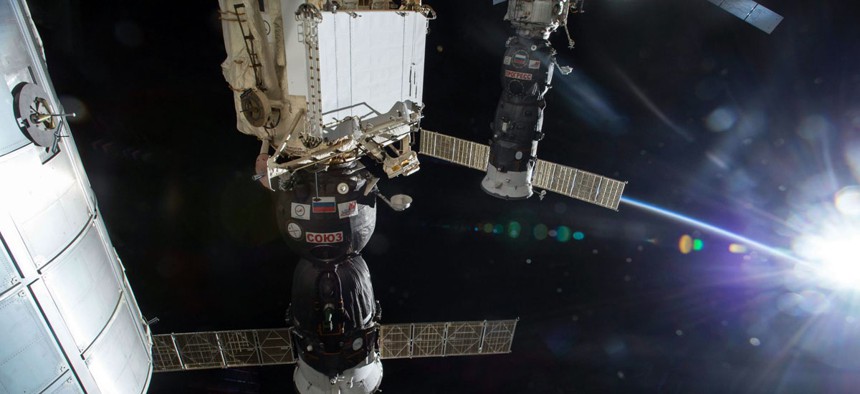An Unmanned Russian Spacecraft Is Spiraling Toward Earth

Progress 47 docked with the International Space Station. This is where Progress 59 would have gone, had it not malfunctioned. NASA
Roscosmos, Russia’s space agency, made attempts to contact the spinning ship and regain control of it, but those efforts have failed.
An unmanned Russian spacecraft is currently spiraling out of control and will soon fall back to Earth. Roscosmos, Russia’s space agency, made attempts to contact the spinning ship and regain control of it, but those efforts have failed. It will now slowly descend through Earth’s atmosphere, where most of it is likely to burn up.
However, it’s possible that pieces could survive re-entry and pose a threat to people on the ground. It’s happened before.
The Progress 59 spacecraft, launched April 28 by a Soyuz rocket (video) from the Baikonur Cosmodrome in Kazakhstan, was to rendezvous with the International Space Station and resupply it with more than 6,000 pounds of food and fuel. But not long after the craft separated from its rocket, Russian flight controllers lost contact with the ship. It never docked with the ISS. On April 17, Space X’s Dragon capsule successfully linked up with the ISS on its resupply mission.
Watch as the Progress spins, the Earth and the sun repeatedly coming in and out of view:
It’s not easy to tell right now when exactly the broken-up spacecraft could hit Earth. In all likelihood, the remaining pieces will land quietly in the ocean somewhere. You can track progress here or here: As of 8:55am ET, the spacecraft was flying westward over London at 4.67 miles per second, 120 miles in the sky.
Perhaps the most notorious incident of a satellite-gone-haywire was the Skylab, the first American manned space station. In 1979, it began falling back toward Earth, inspiring both fear and glee from people on the ground. It broke up over Western Australia, and no one was hurt.
Roscosmos is still trying to figure out what exactly caused the malfunction. Quartz will continue to follow this story and update it with new information.
NEXT STORY: Could Big Data Fix Government’s Cyber Problem?





